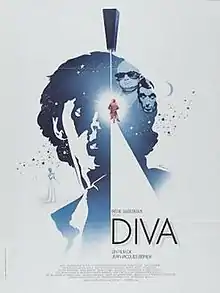Diva (1981 film)
Diva is a 1981 French thriller film directed by Jean-Jacques Beineix, adapted from the novel Diva by Daniel Odier. It eschewed the realist mood of 1970s French cinema and instead adopted a colourful, melodic style, later described as cinéma du look.
| Diva | |
|---|---|
 Film poster | |
| Directed by | Jean-Jacques Beineix |
| Screenplay by | Jean-Jacques Beineix Jean Van Hamme |
| Based on | Diva by Daniel Odier |
| Produced by | Claudie Ossard Irène Silberman Serge Silberman |
| Starring | Frédéric Andréi Wilhelmenia Wiggins Fernandez Richard Bohringer |
| Cinematography | Philippe Rousselot |
| Edited by | Monique Prim Marie-Josèphe Yoyotte |
| Music by | Vladimir Cosma |
Production companies | Les Films Galaxie Greenwich Film Productions |
| Distributed by | Compagnie Commerciale Française Cinématographique |
Release date |
|
Running time | 117 minutes[1] |
| Country | France |
| Languages | French English |
| Budget | $1.5 million |
| Box office | $19.8 million[2] |
The film made a successful debut in France in 1981 with 2,281,569 admissions, and had success in the U.S. the next year, grossing $2,678,103.[2] The film was selected as the French entry for the Best Foreign Language Film at the 54th Academy Awards, but was not accepted as a nominee. Diva became a cult classic and was internationally acclaimed.
Plot
A young Parisian postman, Jules, is obsessed with opera, and particularly with Cynthia Hawkins, a beautiful and celebrated American soprano who has never allowed her singing to be recorded. Jules attends a recital at the Théâtre des Bouffes du Nord in Paris,[3] where Hawkins sings the aria "Ebben? Ne andrò lontana" from the opera La Wally. He covertly makes a high-quality bootleg recording of her performance using a Nagra professional tape-recorder. Afterwards, he steals the gown she was wearing from her dressing room.
Later, Jules accidentally comes into possession of an audio cassette with the recorded testimony of a prostitute, Nadia, which exposes a senior police officer, Commissaire divisionnaire Jean Saporta, as being the boss of a drug trafficking and prostitution racket. Nadia drops the cassette in the bag of the postman's moped moments before she is killed by Saporta's two henchmen—L' Antillais and Le Curé ("The West Indian" and "The Priest").
Two police officers, Paula and Zatopek, are now after Jules, seeking Nadia's cassette, but they only know that it incriminates a prominent gangster and not that the gangster is actually their boss. Jules is also being hunted by Saporta's two henchmen. Two Taiwanese men are also seeking him as they want his unique and valuable recording of Cynthia Hawkins. Jules seeks refuge from all these pursuers with his new friends, the mysterious bohemian Serge Gorodish and his young Vietnamese-French muse, Alba.
Feeling guilty, Jules returns Cynthia Hawkins' dress. She is initially angry, but eventually forgives him. Cynthia is intrigued by Jules' adoration and a kind of romantic relationship develops, expressed by the background of the piano instrumental, Promenade Sentimentale by Vladimir Cosma, as they walk around Paris in the Jardin des Tuileries early one morning. The Taiwanese try to blackmail Cynthia into signing a recording contract with them. Although they do not possess Jules' recording of her performance, they claim they do and threaten to release it as a pirate record if she does not cooperate; she indignantly refuses.

Jules is spotted and chased by the two police officers, but he escapes by riding his moped through the Paris Métro system. He takes refuge in the apartment of a prostitute he knows, but flees when he realizes she is part of Saporta's criminal network—he leaves just before L' Antillais and Le Curé arrive. The enforcers chase him and Jules is shot and wounded, but Gorodish rescues Jules just before Le Curé can kill him. Gorodish and Alba drive Jules to a safe house outside Paris, a remote lighthouse, in Gorodish's antique Citroën Traction Avant.
Gorodish is now in possession of the recording that incriminates Saporta and he uses it to blackmail the Commissaire. The two meet in an abandoned factory. Saporta pays-off Gorodish, but before the meeting had placed a remote control bomb under his car. The two Taiwanese interrupt them and steal the cassette at gunpoint, believing it to be the recording of Cynthia Hawkins. They attempt to drive away in Gorodish's car, but are killed when Saporta detonates his bomb with the intention of killing Gorodish. Gorodish then drives away in an identical Traction Avant that he had hidden in advance.
Meanwhile, Jules returns to Paris to give Cynthia his bootleg recording and lift the threat of blackmail from her. But L'Antillais and Le Curé are lying in wait for him outside her hotel. They abduct him and take him to his loft apartment with the intention of killing him and faking his suicide. However, police officer Paula has been keeping Jules' apartment under surveillance; she saves him by killing Le Curé and wounding L'Antillais. Saporta then appears, kills his surviving henchman, and attempts to kill Jules and Paula, intending to make it look like his dead henchman shot them. Once again Gorodish saves the day by turning out the lights and, in the dark, making Saporta fall down an elevator shaft to his death.
In the film's final scene, Jules meets Cynthia at the Théâtre du Châtelet, where he plays her recording for her and she expresses her nervousness over hearing it because she "never heard [herself] sing."[3]
Cast
- Frédéric Andréi as Jules
- Wilhelmenia Fernandez (billed as Wilhelmenia Wiggins Fernandez) as Cynthia Hawkins
- Richard Bohringer as Gorodish
- Thuy An Luu as Alba
- Jacques Fabbri as Jean Saporta
- Dominique Pinon as Le Curé ("The Priest")
- Gérard Darmon as L'Antillais ("The West Indian")
- Jim Adhi Limas (in French) as the first Taiwanese man
- Anny Romand (in French) as Paula, Police officer
- Patrick Floersheim (in French) as Zatopek, Police officer
- Chantal Deruaz (in French) as Nadia
- Roland Bertin as Weinstadt, Cynthia Hawkin's manager
- Jean-Luc Porraz (in French) as Mermoz, a friend of Jules
- Laure Duthilleul as Mermoz's friend
- Dominique Besnehard as record store employee
- Isabelle Mergault as the girl playing an arcade game
Soundtrack
Highlights of the soundtrack include the aria Ebben? Ne andrò lontana from Alfredo Catalani's opera La Wally, and a pastiche of Erik Satie's Gymnopédies composed by Vladimir Cosma. Fernandez, an established singer, performed her own vocals.[4]
Home video
The film was released on DVD on 29 May 2001 by Anchor Bay Entertainment.[5]
A Blu-ray edition was released by Kino Lorber on 11 August 2020.[6]
Reception
Initial reaction
The film initially was not a commercial success after its March 1981 release in France, where it faced bad press and a hostile reception by critics. However, French audiences slowly grew after it was released in the United States and found success there.[7] Diva played for a year in Paris theaters. David Denby, in New York, upon its 1982 American release, wrote "One of the most audacious and original films to come out of France in recent years...Diva must be the only pop movie inspired by a love of opera."[8]
Film critic Roger Ebert gave it four out of four stars and praised its cast of characters.[9] He called Beineix "a director with an enormous gift for creating visual images" and elaborated on his filmmaking:
The movie is filled with so many small character touches, so many perfectly observed intimacies, so many visual inventions—from the sly to the grand—that the thriller plot is just a bonus. In a way, it doesn't really matter what this movie is about; Pauline Kael has compared Beineix to Orson Welles and, as Welles so often did, he has made a movie that is a feast to look at, regardless of its subject. [...] Here is a director taking audacious chances, doing wild and unpredictable things with his camera and actors, just to celebrate moviemaking.[9]
— Roger Ebert
Ebert also praised the film's chase scene through the Paris metro, writing that it "deserves ranking with the all-time classics, Raiders of the Lost Ark, The French Connection, and Bullitt."[9]
Retrospect
Since its re-release in 2007, Diva has received acclaim from film critics; review aggregator Rotten Tomatoes gives the film a score of 96% based on reviews from 56 critics, with an average score of 8.2 out of 10. The website's critical consensus states: "Beineix combines unique cinematography, an intelligent script, and a brilliant soundtrack to make Diva a stylishly memorable Film".[10] Lisa Schwarzbaum of Entertainment Weekly gave it an A rating and praised its "voluptuous romanticism". She wrote of the film's visual ties to cinéma du look, "the movie's mad excitement hinges entirely on the pleasure to be had in moving our eye from one gorgeously composed stage set of artifice to another."[11]
Awards
- César Awards:
- Best Debut: Jean-Jacques Beineix
- Music: Vladimir Cosma
- Cinematography: Philippe Rousselot
- Sound: Jean-Pierre Ruh
The film was entered into the 12th Moscow International Film Festival[12] and was selected as the French entry for the Best Foreign Language Film at the 54th Academy Awards, but was not accepted as a nominee.[13]
See also
References
- "DIVA (AA)". British Board of Film Classification. 17 June 1982. Retrieved 2 February 2013.
- "Diva (1981)" (in French). JP's Box-Office.
- "Film Locations for Jean-Jacques Beineix's Diva (1981), in Paris". The Worldwide Guide to Movie Locations. Retrieved 18 October 2023.
- Ebert, Roger (10 January 2008). "Great Movie: Diva". Retrieved 30 December 2019.
- Tribbey, Ralph (5 April 2001). "DVD NEWS BRIEFS: Anchor Bay in May; Aguilera on DVD; Koch's VaultKoch's Vault". hive4media.com. Archived from the original on 18 April 2001. Retrieved 6 September 2019.
- "Diva Blu-ray". blu-ray.com. 20 May 2020. Retrieved 14 August 2020.
- Rémi Fournier Lanzoni (22 October 2015). French Cinema: From Its Beginnings to the Present. Bloomsbury Publishing. p. 342. ISBN 978-1-5013-0309-8.
- LLC, New York Media (19 April 1982). New York Magazine. New York Media, LLC – via Google Books.
- Ebert, Roger (1 January 1982). "Diva". Chicago Sun-Times. Retrieved 23 March 2012.
- "Diva". Rotten Tomatoes. IGN Entertainment. 3 June 2008. Retrieved 23 March 2012.
- Schwarzbaum, Lisa (16 November 2007). "Diva Review". Entertainment Weekly. No. 964. Retrieved 23 March 2012.
- "12th Moscow International Film Festival (1981)". MIFF. Archived from the original on 21 April 2013. Retrieved 26 January 2013.
- Margaret Herrick Library, Academy of Motion Picture Arts and Sciences